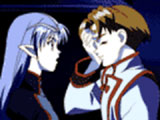

Quick Links:
Crest of the Stars, Volume 1: To the Stars
The space opera genre tends to evoke images of intergalactic warfare of an epic scale. Political intrigue, diplomacy, and the tactics of war in space, complete with space battles of grand proportions, abound, while character development typically takes a back seat - the number of players in such an epic tale is often too great to deal with any one in considerable detail. Not all space operas follow this trend, however, opting instead to thrust the development of a select few characters to the forefront, with the war raging in space serving as a backdrop to that development. Crest of the Stars is one such alternate space opera.
Opening with the sounds of an alien tongue amidst flashes of a chaotic battle, a sense of mystery and intrigue is established right from the start. Be it a glimpse forward to a battle to come or a flashback to a previous encounter, the viewer is left wondering; and in my case, I was left wondering, but also drawn in and genuinely interested in finding out how this brief opening battle would end up fitting into the story arc. The story picks up in earnest, however, on the planet Martine as the space faring Humankind Empire Abh invasion fleet makes its approach, refusing negotiation attempts from government officials of the Hyde star system. Martine's meager Space Defense System being of little threat to the Abh's vast military superiority, President Rock Lin soon orders a conditional surrender - the condition for which brings the scorn of his people not only on himself, but on his young son as well. Selling out the citizens of Martine to gain the priviledged life of a nobleman for himself and his family, as well as the position of ruler of the Hyde system, Rock's son Jinto must now face a life in which he's seen above all else as the son of a traitor.
Seven years later, we find Jinto waiting aboard an orbital space station for a transport destined for Abh military school, 15 years of military service being a prerequisite for assuming his role as Prince of the Hyde system. Adorned in full Abh attire, the fear and reproach Jinto is met with from everyone on the station illustrates the sense of alienation someone in his position must feel - a sense of alienation akin to the feeling of being an outsider known to many at one point or another growing up, allowing Jinto's character to be more easily identified with. One scene in particular, where Jinto attempts to retrieve a stolen handbag for an elderly woman, but is greeted with nothing but disdain for his trouble due to his association with the Abh, paints Jinto as a boy out of place among his own people. Perhaps fortunately, Jinto isn't destined to live among his own people and soon meets his first Abh, Lafiel, the pilot trainee sent to escort him to a battleship en route to the Abh capital.
While a conflict between the Abh and an unknown enemy is brewing without question, battle scenes are hard to come by in these first four episodes, focusing rather on the relationship between Jinto and Lafiel. This being the case, this first disc lives or dies by how interesting the interaction between these two characters is, and as luck would have it, there's a great deal to enjoy about it so far. Between a number of amusing exchanges, highlighting Jinto's ignorance of Abh culture, in spite of learning about it briefly in school, and the insight into what the Abh people are like via Lafiel's brief explanation about her childhood and what it means to be a "child of love," both characters end up possessing a certain endearing quality, as does their relationship. Some of the dialogue comes off as rather forced - certain exchanges during flashbacks to Jinto's childhood would have been better served by a poignant silence for example, while others between Jinto and Lafiel seem somewhat silly - but overall, the dialogue flows well and moves the story along nicely.
While the dialogue generally flowed well when listening to the Japanese track on the DVD, it was a completely different story with the English dub. The English voice acting is often so stiff and halting, any attempt at tension or emotion is hard to take seriously. Shatneresque line delivery runs rampant throughout the dub, yet lacks even the emotion Shatner might add to his halting speech. As such, watching Crest of the Stars subbed comes highly recommended, as the Japanese voice acting gets the job done with believable delivery, setting the mood of each scene quite well.
Crest of the Stars enjoyed the luxury of a fairly sizeable budget, and it shows for the most part in the animation. The few glimpses of space battles we're treated to are rendered beautifully, as are a number of other richly illustrated scenes. As is often the case with TV series, however, the animation quality drops significantly every now and then during low motion scenes, and frame saving tricks are used to cut down on how much needs to be animated. A number of the overlay effects, like general screen noise giving the illusion of a field of stars on top of the image, seemed tacked on and somewhat out of place, while other such effects, like border haze providing scenes with a dream like quality, worked very well. Overall, in spite of a few quibbles here and there, the animation made for an enjoyable experience, as did the character designs. The Abh in particular, being a race of humans having genetically manipulated themselves for life in space, possess an interesting set of features, much like a sci-fi variant on elves. Their military uniforms were also well designed with a nice balance between simplicity and flamboyant elegance.
Unfortunatly, the video quality of this first disc ends up taking away from the otherwise pleasant visual experience. Mild blockiness was apparent during a number of fast motion scenes - even in one where Jinto merely jerked his head around - while some digital artifacting can be seen in some of the otherwise lush space illustrations, like the reds of densely clustered stars and gas formations seen in the opening sequence. Apparently Bandai opted to use a different mastering house with the second disc, so hopefully these issues won't reappear in the second volume.
No such problems could be found in the audio quality, however, as both the English and Japanese tracks sounded great. The audio consisted of dialogue for the most part, which was always perfectly clear, complemented nicely with the occasional musical interlude. These musical interludes were classically orchestrated pieces for the most part, which fit the sci-fi feel of the show like a glove. Subdued to the point where it was never distracting, coupled with how appropriate it was in combination with the show's subject matter, the music served to add a layer of depth to the scenes it accompanied. The opening theme had an epic flair to it, with a strong play between strings and horns perfectly setting the tone for a space opera, while the ending song, The Lost Blue Sky, was a departure from the orchestration of the rest of the score - in place of the usual strings and horns was an acoustic guitar and a piano, with sentimental vocals singing a sad ballad. While not great on its own, with the exception of The Lost Blue Sky, Crest of the Star's music is very good when listened to in the context of the show.
As far as packaging goes, the cover art is very well done, featuring only Jinto and Lafiel, the Crest of the Stars logo, and a well designed background. The insert features the same art as the cover, but folds out to reveal information on the Abh language, as well as their alphabet, which is a nice treat. Presentation on the disc itself is fairly good - the menus look nice and are easy to navigate, but aren't without a few annoyances, like the way the language selection menu works. Finally, there are only two disc extras, but what's there is good. The first extra is a textless opening sequence - one of my favorite types of extras, both for openings and closings - and the second is a small collection of information on the Abh, which gives a brief overview of their race without spoiling any of the story.
Ultimately, this first volume of Crest of the Stars might disappoint viewers going in expecting a standard space opera with no shortage of intergalactic warfare, but the strong character driven introduction to what promises to be an engaging story should prove entertaining for most. The pacing is a little on the slow side, with very little action so far and much of the story being told via dialogue, but I enjoyed the time spent getting to know the characters. I'd recommend this first disc to sci-fi fans looking for a dose of character development to go with their space opera, but the slow pace and sparse action might not be for everyone.
Distributor: Bandai Creator: Sunrise Released: 1999
Video Quality: B- Audio Quality: B+ Presentation: B Content: B+ Overall: B



